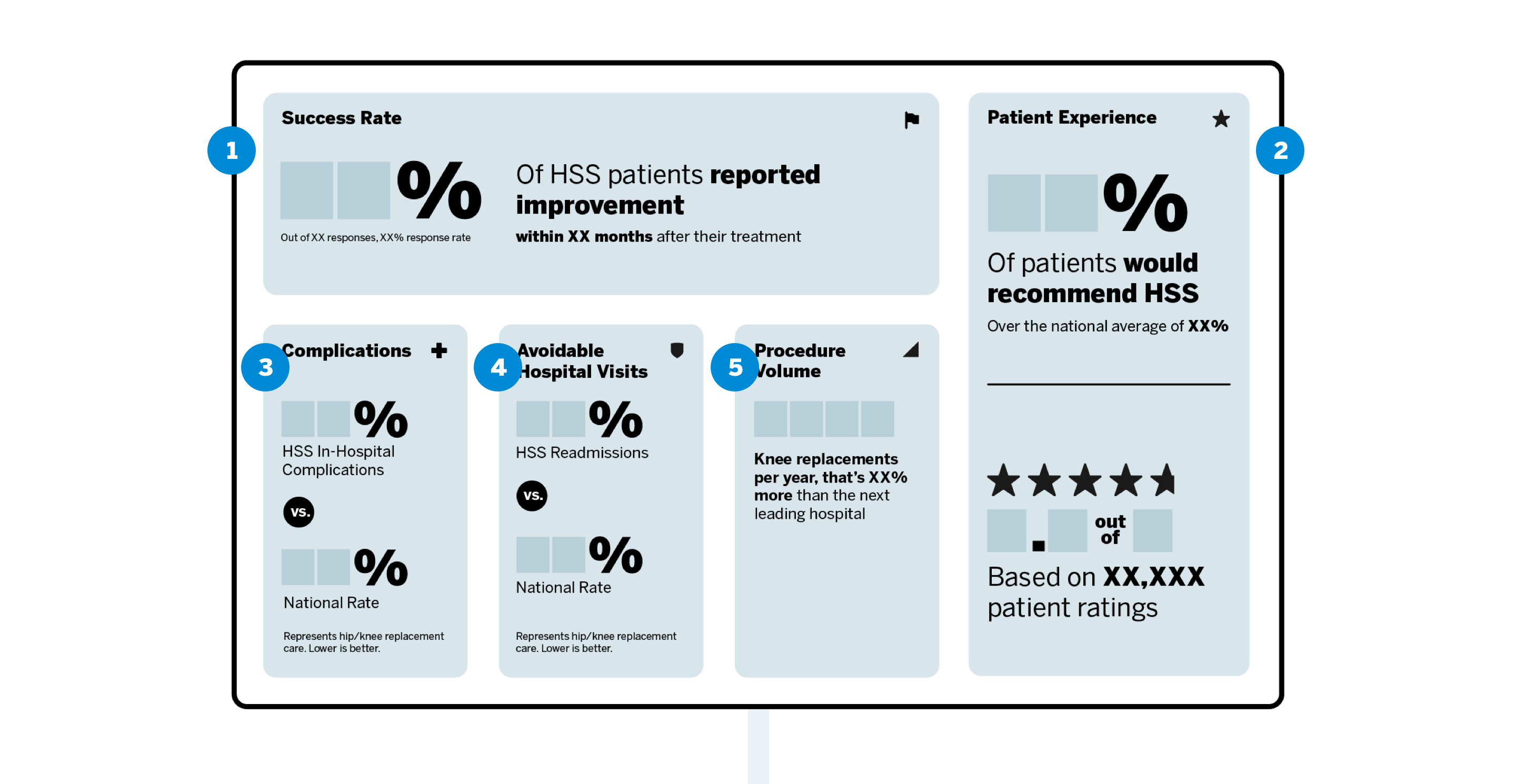Understanding how
to compare your
healthcare options
So you can get back to what's important

Understanding how
to compare your
healthcare options
So you can get back to what's important
Understanding how
to compare your
healthcare options
So you can get back
to what's important
What makes one hospital better than another?
It's not always easy to tell what makes one hospital better than another. We often don't have a clear understanding of the differences between hospitals — or how likely those differences are to affect our health. But making these comparisons may be more important — and easier — than you think.
Getting the advice of your doctor and family members is a good first step. But there's more you can do to protect your health, especially when surgery and other treatments are involved. This includes asking your hospital for important data that can help you choose better and avoid unnecessary risks.
|
Avoid unnecessary risks
|
|
Avoid unnecessary risks
|
Make a more informed decision
Making care decisions without knowing how your hospital stacks up for a given procedure can put you at unnecessary risk. Even if you plan to go to a well-known hospital.
That's because not all hospitals do things the same. Some are more reliable than others. And this difference can increase the chances that you'll experience a setback, such as a complication in the hospital or something else that happens once you're home.
These avoidable issues could affect your health or mean time away from work and family. Not to mention unnecessary discomfort and stress.


So how can you protect yourself?
|
1 |
2 |
| Choosing one healthcare provider over another may get you a very different result. That's why it's important to ask for reliability data for your specific surgery or treatment so that you can make an informed decision. |
HSS has developed a new tool
The Hospital
Reliability
Scorecard


So how can you protect yourself?
|
1 |
2 |
| Choosing one healthcare provider over another may get you a very different result. That's why it's important to ask for reliability data for your specific surgery or treatment so that you can make an informed decision. |
This tool is designed to help anyone having surgery, no matter where you seek out care
Let us explain the Hospital Reliablity Scorecard through this short video 
The Five Factors of Reliability
The Hospital Reliability Scorecard features five factors that indicate how reliable a hospital is at performing a given procedure. These factors help you learn what data to ask for and explain why each one matters to your health. Learn why we chose these factors.

The Five Factors of Reliability

![]()
![]() Success Rate
Success Rate
It’s critical to know whether patients at a specific hospital actually see improvement after their treatment. This data shows how much better patients report feeling one year after treatment. Ask your hospital about the patient-reported success rate for your procedure. A higher success rate is better.

![]()
![]() Patient Experience
Patient Experience
Feedback from fellow patients says a lot about the care you can expect to receive. Look for real stories from real patients. "Likelihood to Recommend” data is also collected and made publicly available by Medicare on the Care Compare Website. A higher likelihood to recommend is better.

![]()
![]() Complication Rate
Complication Rate
Patients admitted to the hospital for treatment sometimes develop serious, even life-threatening complications, which may stem from the care they receive. Hospitals can often prevent these complications by following certain best practices. This data is available on the Care Compare Website. A lower complication rate is better.

![]()
![]() Avoidable Hospital Visits
Avoidable Hospital Visits
No one wants to find themselves back in the hospital unexpectedly after a procedure — and your hospital can help prevent return visits. This data shows whether a hospital is doing what’s needed to reduce the risk of harmful events such as health-care associated infections and other serious problems that require re-hospitalization. Check Medicare’s Care Compare Website for this info. A lower rate of unplanned visits is better.


 Procedure Volume
Procedure Volume
We all know that practice makes perfect. The more time doctors and staff spend on cases like yours, the greater their expertise. Ask your hospital about the volume for your procedure. A higher procedure volume is better.
|
This is just one example of a valuable data point. We’re sharing our own data for ten of the most common orthopedic procedures. Our hope is that more hospitals will also make these numbers available to patients to better serve their needs.
Hospitals with a high volume of orthopedic patients have 37%
fewer deaths  58%
fewer infections |
|
This is just one example of a valuable data point. We’re sharing our own data for ten of the most common orthopedic procedures Our hope is that more Hospitals will also make these numbers available to patients to better serve their needs.
Hospitals with a high volume of orthopedic patients have 37%
fewer deaths  58%
fewer infections |

How much do endorsements from third parties really matter? The answer all depends on who’s doing the endorsing. Several groups of independent experts have dug deeper and found U.S. News & World Report to be the most credible of the various hospital rating systems.


How much do endorsements from third parties really matter? The answer all depends on who's doing the endorsing. Several groups of independent experts have dug deeper and found U.S. News & World Report to be the most credible of the various hospital rating systems.
Next Step: Select a Procedure